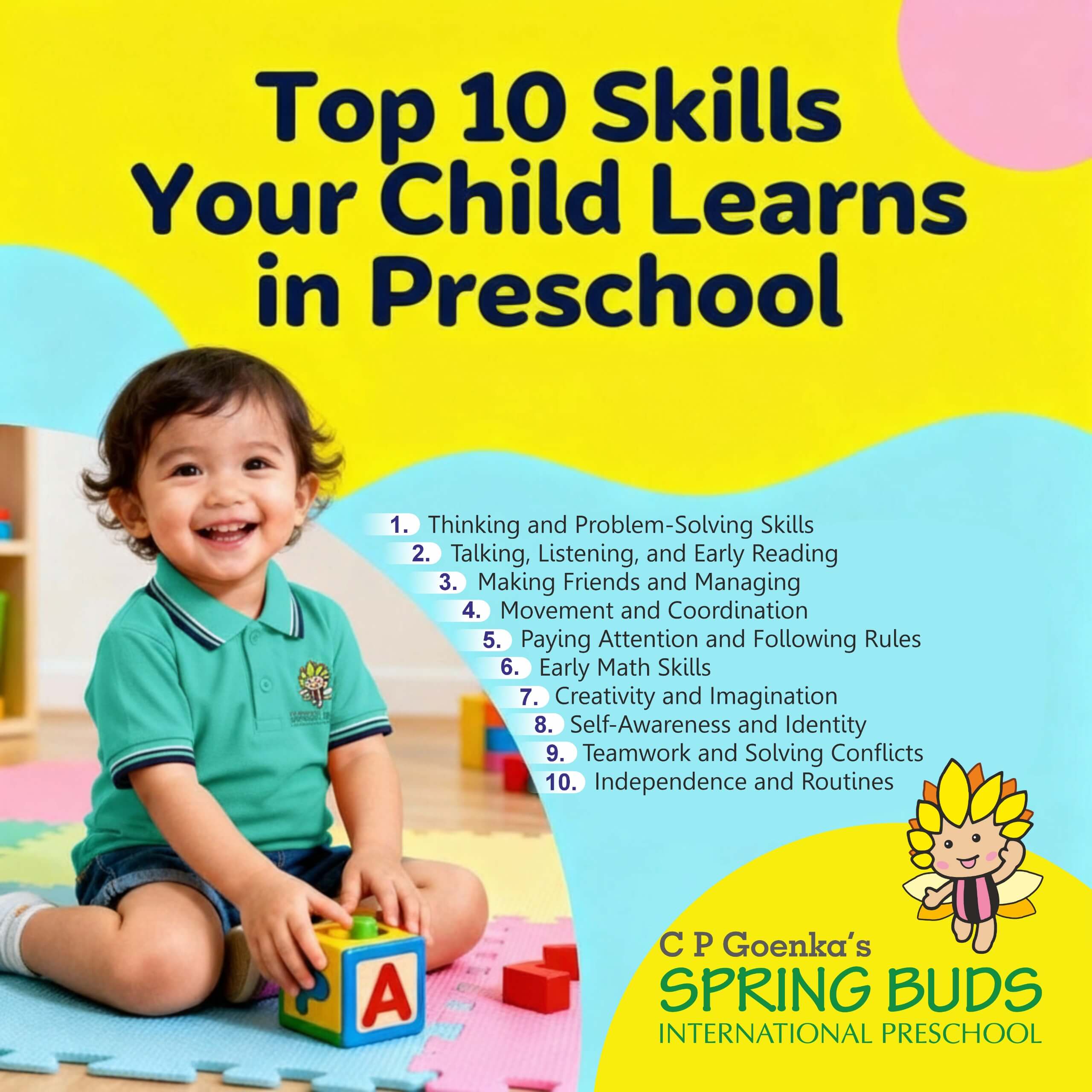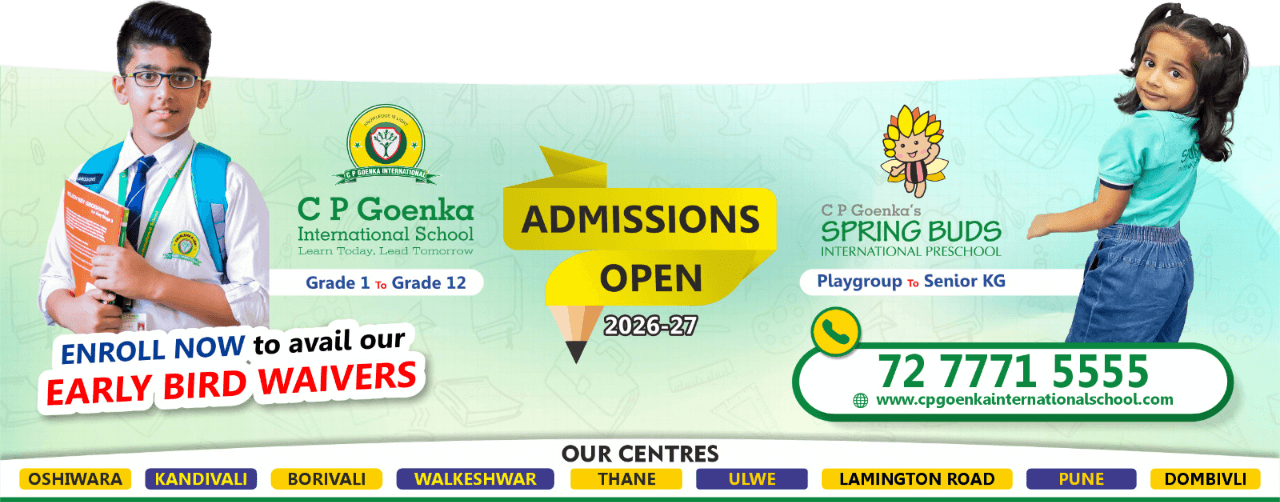
To Top
Top 10 Skills Your Child Learns in Preschool
When parents think about preschool, many imagine children singing songs, coloring pictures pages, or playing with toys. It may look simple, but preschool is actually one of the most important stages of a child’s life. Between the ages of Two and Five, children grow at a rapid pace—not just physically but also mentally and emotionally.
At C P Goenka's Spring Buds International Preschool every activity is carefully designed to help children build important life skills. From learning to share toys to holding a pencil correctly, these skills prepare children for success in school and in life.
Let’s take a closer look at the Top 10 Skills Your Child Learns in Preschool and why they matter.
1. Thinking and Problem-Solving Skills
Preschoolers are naturally curious. They ask endless “Why?” and “How?” questions. A good preschool channels this curiosity into activities that build thinking and problem-solving abilities.
How it happens:
- Solving puzzles and matching games.
- Building towers with blocks and figuring out why they fall.
- Simple experiments like mixing colors or watching a seed sprout.
Why it matters:
These experiences help children:
- Understand cause and effect.
- Make decisions on their own.
- Strengthen memory and logical thinking.
Parent Tip: Encourage your child at home by letting them try things on their own—even if they make mistakes. Problem-solving grows stronger with practice.
2. Talking, Listening, and Early Reading
Language is the foundation of learning. In preschool, children are surrounded by words, rhyming, songs, stories, and conversations.
How it happens:
- Circle time discussions with teachers.
- Singing rhymes and action songs.
- Storytelling sessions and picture books.
- Scribbling and recognizing letters.
Why it matters:
- Children learn how to express thoughts clearly.
- They build listening skills by paying attention to teachers and friends.
- Early reading habits begin, making school easier later.
Parent Tip: Read aloud to your child every night. Even 10 minutes of bedtime reading improves vocabulary and builds a love for books.
3. Making Friends and Managing
For many children, preschool is the first time they spend hours away from parents. This is where they start learning how to make friends, play in groups, and manage emotions.
How it happens:
- Playing group games and sharing toys.
- Taking turns during activities.
- Teachers guiding them when conflicts happen.
Why it matters:
- Children learn empathy ability to understanding how others feel and healthy coping
- They develop confidence in social situations.
- They learn to manage anger, sadness, or frustration in healthy ways.
Parent Tip: Every day, ask your child “Who did you play with today?” This facilitates their ability to discuss their emotions and think back on social interactions.
4. Movement and Coordination
Children at this age are full of energy. Preschool gives them many opportunities to move, which develops both gross motor skills (big movements) and fine motor skills (small movements).
Gross Motor Skills:
- Running, jumping, hopping, and balancing.
- Outdoor play on slides, swings, and climbing frames.
Fine Motor Skills:
- Holding crayons, pencils, and paintbrushes.
- Cutting with safety scissors.
- Threading beads or playing with clay.
Why it matters:
- Good motor skills prepare children for writing, sports, and daily life tasks like dressing themselves.
Parent Tip: Let your child help with small chores like folding napkins, pouring water, or buttoning their clothes. These everyday tasks strengthen motor skills.
5. Paying Attention and Following Rules
Young children are naturally active and get distracted easily. Preschool slowly teaches them how to focus, follow instructions, and build self-control.
How it happens:
- Listening during storytime.
- Playing games that require waiting for a turn.
- Following two-step instructions like “Pick up your toy and put it in the basket.”
Why it matters:
- Helps children succeed in structured classrooms.
- Builds patience and self-regulation.
- Improves memory and concentration.
Parent Tip: Play simple games like “Simon Says” or “Red Light, Green Light” at home. These fun games teach listening and focus.
6. Early Math Skills
Math in preschool doesn’t look like worksheets. Instead, it is introduced through fun, everyday activities.
How it happens:
- Counting toys, snacks, or blocks.
- Sorting objects by color, size, or shape.
- Recognizing numbers on charts.
- Identifying patterns like “red-blue-red-blue.”
Why it matters:
- Builds number sense, which is the base of mathematics.
- Helps children see how math is part of daily life.
- Makes future math learning easier and less stressful.
Parent Tip: Involve your child in daily math—count stairs together, talk about “big” and “small,” or let them help while measuring ingredients.
7. Creativity and Imagination
Preschool is full of activities that let children explore their creative side. Imagination and creativity are just as important as academics because they help children think in new ways.
How it happens:
- Pretend play like “playing house,” “doctor,” or “shopkeeper.”
- Drawing, coloring, and painting.
- Music, dance, and role-play activities.
Why it matters:
- Boosts problem-solving and innovation.
- Helps children express emotions.
- Makes learning fun and engaging.
Parent Tip: Keep simple props at home—like scarves, toy dishes, or cardboard boxes. Children can use these to create endless pretend-play stories.
8. Self-Awareness and Identity
During preschool, children start to understand themselves better. They notice what they like, what they are good at, and how they are different from others.
How it happens:
- Talking about their favorite colors, foods, things or games.
- Choosing activities during free play.
- Teachers encouraging them to express opinions.
Why it matters:
- Builds confidence and a positive self-image.
- Encourages independence in decision-making.
- Helps them respect differences in others.
Parent Tip: Celebrate your child’s uniqueness. Say things like, “You drew such a creative picture!” This builds pride in their abilities.
9. Teamwork and Solving Conflicts
Playing with others isn’t always easy. Children may argue over toys or get upset if things don’t go their way. Preschool helps them learn teamwork and conflict resolution.
How it happens:
- Working together on group projects and playing games.
- Teachers guiding children to talk and solve problems.
- Learning phrases like “Can I have a turn?” or “Let’s do it together.”
Why it matters:
- Prepares children for classrooms where group work is common.
- Teaches respect, patience, and compromise.
- Builds long-lasting friendship skills.
Parent Tip: At home, if siblings fight, guide them to talk it out instead of solving it for them immediately. This builds problem-solving in social situations.
10. Independence and Routines
How it happens:
- Eating snacks on their own.
- Hand washing prior to eating.
- Putting toys back after play.
- Following daily schedules like circle time or nap time.
Why it matters:
- Builds responsibility and self-confidence.
- Helps children adjust easily when they enter primary school.
- Teaches discipline in an enjoyable manner.
Parent Tip: Encourage your child to do small things independently, like dressing themselves or packing their own bag. Give them credit for each small accomplishment.











